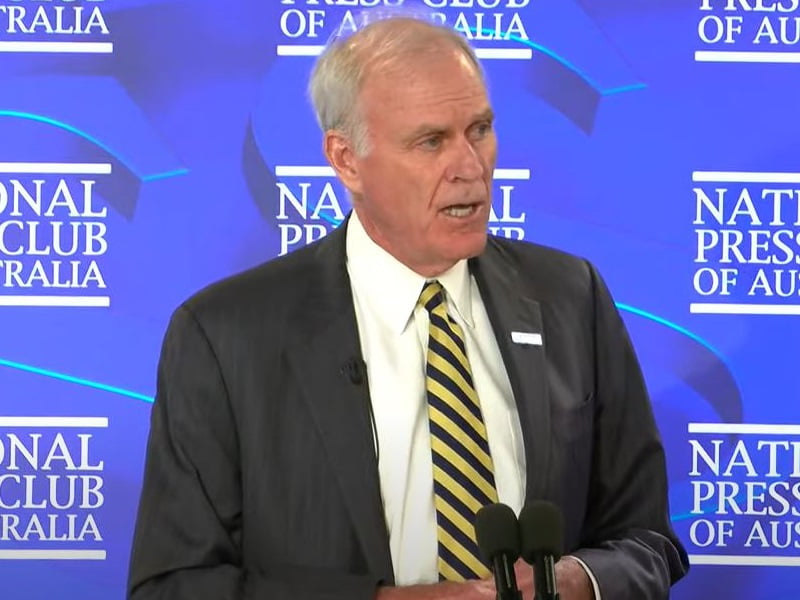A former American naval chief-turned-venture capitalist says momentum is building for the US to relax defence technology export controls that present an obstacle to not only the AUKUS security pact, but also wider competition in defence innovation and economic growth.
In an address to the Press Club on Monday, former US Navy secretary Richard Spencer singled out the International Traffic in Arms Regulations (ITAR) as the “biggest speed bump” that must be addressed in order to facilitate closer collaboration between US allies.
He said the hurdle “has to be addressed; it will be addressed”, while urging Canberra to continue what Defence minister Richard Marles started when he began publicly pressuring the US to ease arms export restrictions earlier this month.

ITAR – which restrict and control the export of defence and military-related technologies to safeguard US national security – is deemed a major stumbling block to the success of AUKUS as it prevents the meaningful sharing of IP.
The ITAR regulations were recently criticised by four former US Ambassadors to Australia, who said “national security is now undermined by outdated ITAR laws that are unintentionally handing a technological and military advantage to adversaries”.
Australia is currently working with the US to ensure technology transfer is not hindered by the red tape, with Canada’s exemption to “certain transfers” under ITAR seen as a potential model that could be replicated.
Mr Spencer, who spent two years as US Navy secretary before being fired for opposing an order of former President Donald Trump in 2019, said ITAR needed reform amid renewed great power competition, referring to the changing power play between the US and China.
“Everyone’s responding to this concept of great power competition, but… there’s more to great power competition than military budgets, planes and submarines,” the former secretary and one-time military captain said.
“In light of AUKUS, we should embrace the competition, not so much deny [our competitors] the technologies. Let us compete one on one, head on head. Our countries have not meaningfully faced off a competitor since World War Two or, arguably, the Cold War.
“We also don’t have the luxury of time in my eyes, so urgency and agility are the operative words. We must provide the private sector the guidelines to compete. Knock down the speed bumps – and I specifically am talking about ITAR, to be very frank with you.”
As the now managing director of Pallas Ventures and business partner of Australia’s former Ambassador to the US Joe Hockey at advisory firm Bondi Partners, Mr Spencer said ITAR was regularly mentioned as a factor in companies not wanting to bring technology to the US.
“Being in the venture business, continually on a global basis I’m hearing… ‘we’ve got a great technology’ and the next statement might be ‘I can’t bring it into the US because I can’t get it out, or ‘I don’t even want to address it with the US because ITAR is going to trip me up’,” he said.
But he believes change is afoot in Congress, with the Russian invasion of Ukraine kickstarting greater data and intelligence sharing between the US and its allies.
“There is a goal… to have ITAR eliminated and or by exception – and what I mean by that is ITAR regulations are relaxed – and if there is an exceptional technology, that is taken up on a one case basis,” he said.
“You all have so many great technologies here in Australia that I would love to see both of us working on, and also we have some great technologies that we would like to bring over to combine,” he said.
“And they have the same worry that the minute they bring it over to Australia or any foreign country and try to get it back, they’re wrapped up in the ITAR conundrum. It has to be addressed; it will be addressed.”
Mr Spencer also applauded Minister for Defence Richard Marles for pressuring US Secretary of Defense Lloyd Austin on ITAR ahead of announcing its intention to buy up to five Virginia-class nuclear submarines in the first instance, before building eight new SSN-AUKUS submarines.
But he said that “push should become more of a shove”, urging Canberra to “press the issue yourselves” to enable change.
“We’ll do our work on our side. There’s many people in the US that want to see the ITAR regulations either eradicated or relaxed when I comes to working with our allies.”
On AUKUS, Mr Spencer said the trilateral security pact is a “momentous step forward… in the correct direction to address the security of Australia and the Indo-Pacific region”, including in relation quantum, artificial intelligence, biotechnology and rare earths.
“The submarine announcement is exceptional for many reasons… It is the first step where three countries will be sharing technologies, skillsets and manpower to bring a new military capability to Australia,” he said.
“Having had exposure to the nuclear-powered naval program, the impact that it had not only on national security in the US but also research and development, technology, manufacturing and employment was very impressive to say the least.”
Do you know more? Contact James Riley via Email.

